
Mercedes-Benz iShowroom


Mr. Ho Ley Hoon, Sales Manager of Jati Transport Sdn Bhd officially launching the new Mercedes-Benz iShowroom
Jati Transport Sdn Bhd has upped their game in the showroom department. Gone are the days of Mercedes-Benz brochures or pamphlets at their showroom. Last night the management team unveiled their first ever digital brochure app. With this app, customers are able to get a close up preview with their preference on the variety of Mercedes-Benz model available for order.
App is called The Mercedes-Benz iShowroom which acts as a digital brochure which allows prospective customers to choose and view which features and equipment best suits them. It’s like buying a computer online and choosing your own specs. Same thing applies here.
The best part of the app is that it allows the customer to choose their financing solution by dragging the button to see his or her budget needs. You can adjust the downpayment and the length of the loan with a touch of a button. Awesome feature!!
With the iShowroom, you can compare the different types of colors and fabrics and even rims of the available Mercedes-Benz models. It can also be viewed on 3 different angles to give the customer a wholistic feel online. There are also videos and interactive applications in making your car shopping experience more exciting than usual.
The sales executive team will be in charge of the iShowroom app whenever you pay a visit to the showroom. Or even better, they can drop by your area or pay you a visit and do a visual presentation to you with their iShowroom app.
Prospective customer can request for an email to be sent or print out after he or she has selected the options of the model for easy reference.
Mr. Ho Ley Hoon, Sales Manager of Jati Transport Sdn Bhd said, “Mercedes-Benz Brunei has been the first to introduce the concept of converting the traditional physical brochure into digital brochure via an app in Brunei. The idea is to offer our customers a unique and interesting experience to match their latest lifestyle when they visit our showroom. Furthermore, our sales executives are well equipped and will able to bring the iShowroom experience to your doorstep or wherever you are.”
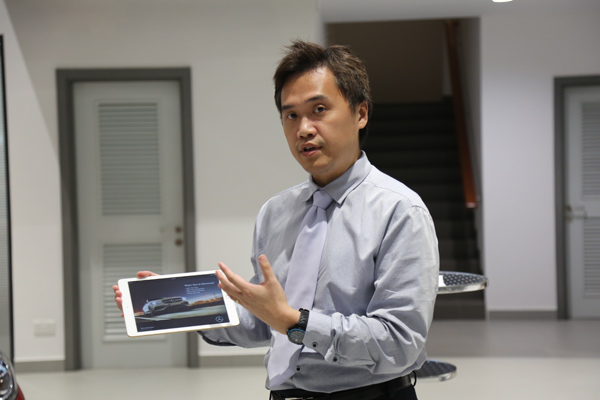
Daniel Loo, Marketing Executive of Jati Transport demo-ing on how the iShowroom works
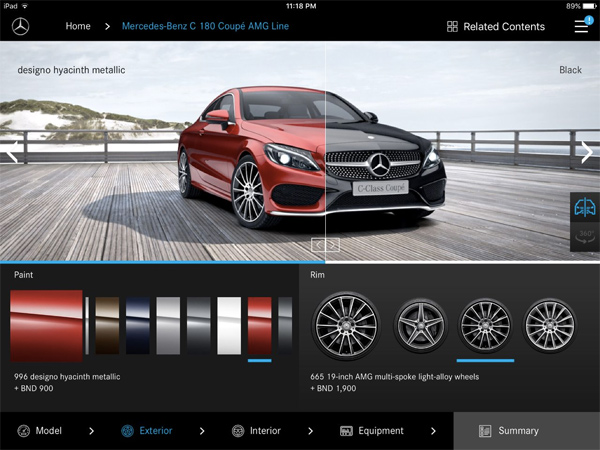
I like how you can compare between colours
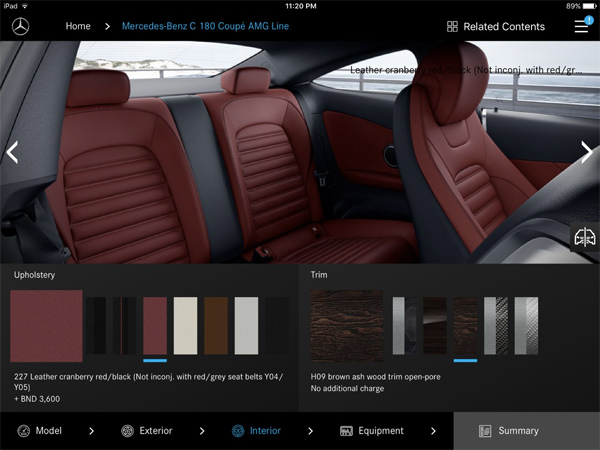
Easy to customize and visualize to your preference
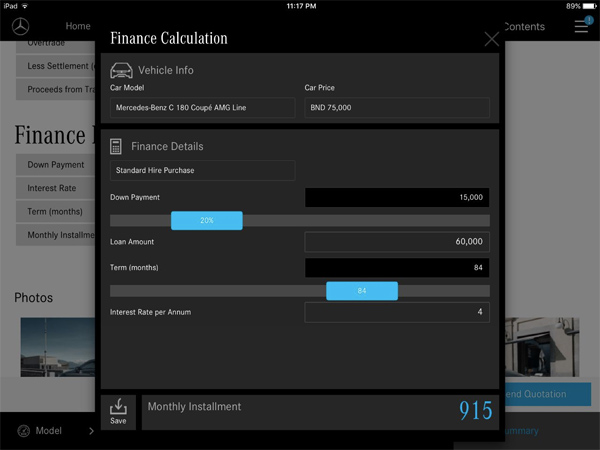
The financial solution for customer’s preference. Easy to use and effective.
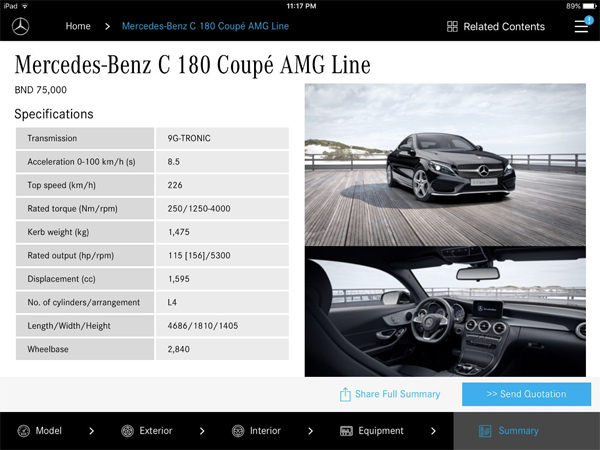
How the summary looks like once you are done with the customization
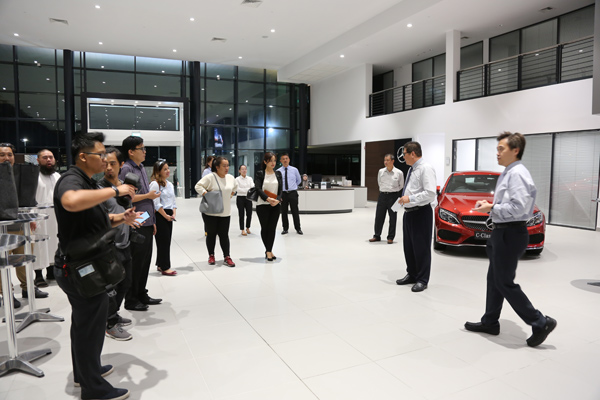
Members of the media had the privilege to witness the new iShowroom
BHC World Cup Campaign

Click image to see more

The Kickoff Day has been a success for @bruneicement (Butra Heidelberg Cement) as they have garnered interest from the public on their Kickoff Campaign where the grand winner will be flying to Russia for the upcoming World Cup 2018.
All the clues were given periodically on @bruneicement instagram and it started with the Pre-Quarter Final – Scavenger Hunt as they have search for clues of the hidden item.
With the hashtag #bhcworldcup18 you will be able to see some of the photos posted on social media and one of them will be lucky enough to win a trip for two to Russia 2018.
There were some monuments and landmarks of Brunei Darussalam especially the new RIPAS bridge and different landmarks in other districts of Brunei Darussalam.
The organizers also have been active in Bandarku Ceria and Tutongku Ceria for the public to get involved in the Kickoff competition.
So do follow @bruneicement or my IG @ranoadidas for updates on their next clues and make sure you follow the instructions to be eligible 🙂

One of the ticket hunt was at Supa Save Seria

The official hashtag for campaign
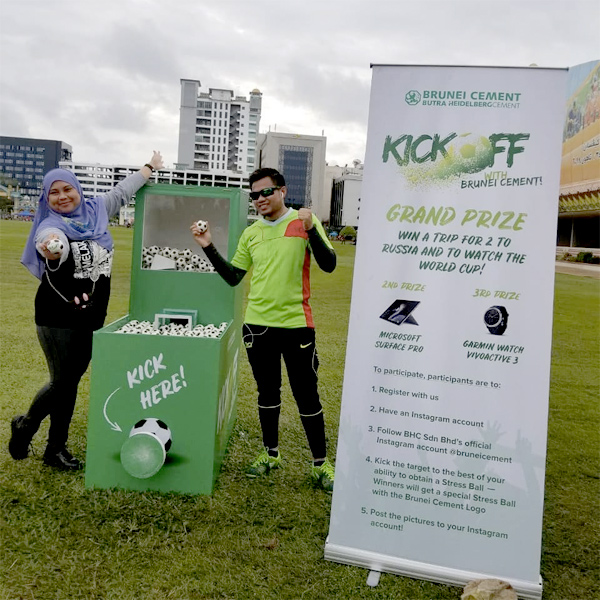
One of the events that took place at Bandarku Ceria
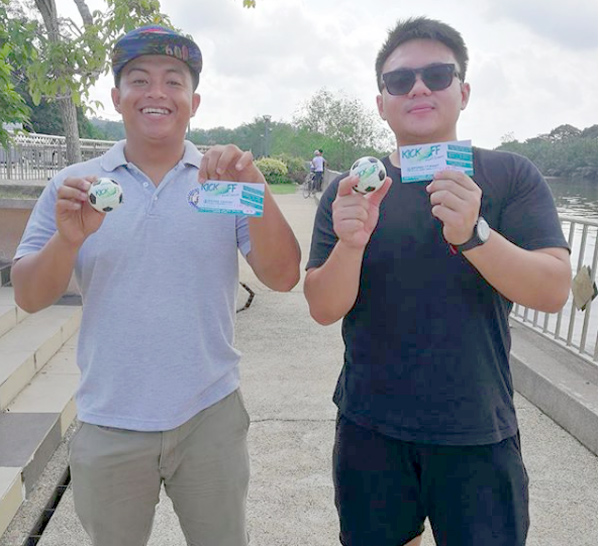
Some of the contestants at Tutongku Ceria

A lady registering herself to be eligible for the lucky draw
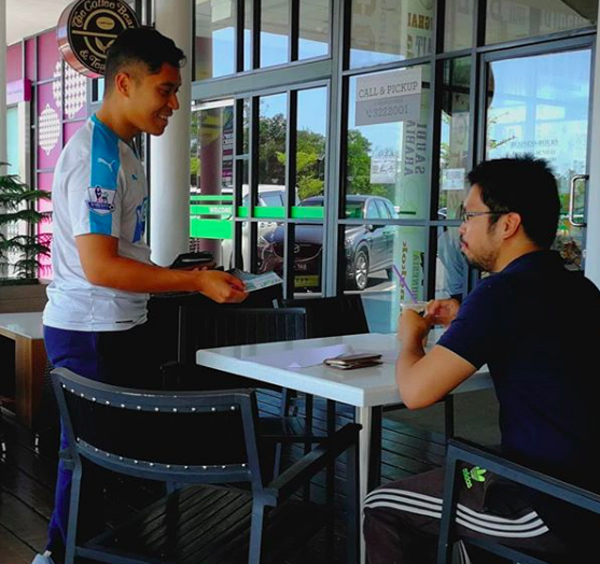
A familiar face also aimed for the grand prize. Good luck!!
Auto Bild readers affirm: Audi is the leading brand for quality

Auto Bild reader survey: Audi leads all brands in the quality ratings. Picture: Audi A7 Sportback
• Audi celebrates a decisive victory in the “Best Brands” reader survey
• The brand ranks first in quality in eight out of 14 categories
• Success in the price/performance rating and in reliability as well
With eight first place finishes in 14 categories, Audi dominated the quality ratings in Auto Bild magazine’s “Best Brands in All Classes” reader survey. No brand performed better in the core criteria of the image survey, with more than 70,000 readers participating.
“Our goal is to delight customers with top quality in the premium segment,” says Werner Zimmermann, Head of Audi Quality Assurance. “The readers of Auto Bild have affirmed the success of our efforts here in a most impressive way.”
In the “Best Brands in All Classes” survey, readers of Auto Bild trade magazine rated 38 brands in 14 vehicle categories. Quality, design and price/performance ratio are considered the core criteria here.
Audi topped the quality ranking in no less than eight categories: compact; midsize; full-size; luxury; convertibles up to €50,000; and small, medium and large SUVs. Audi clinched two further victories in the price/performance ratings – in the luxury class and in the convertibles over €50,000 class. No other manufacturer was more successful in the core criteria. In addition, victory in the reliability rating across all classes went to the brand with the four rings. This increased the total of first places to eleven – an achievement that continued Audi’s strong finish in the “Best Brands” of 2016.
Behind the scene: CUCKOO factories
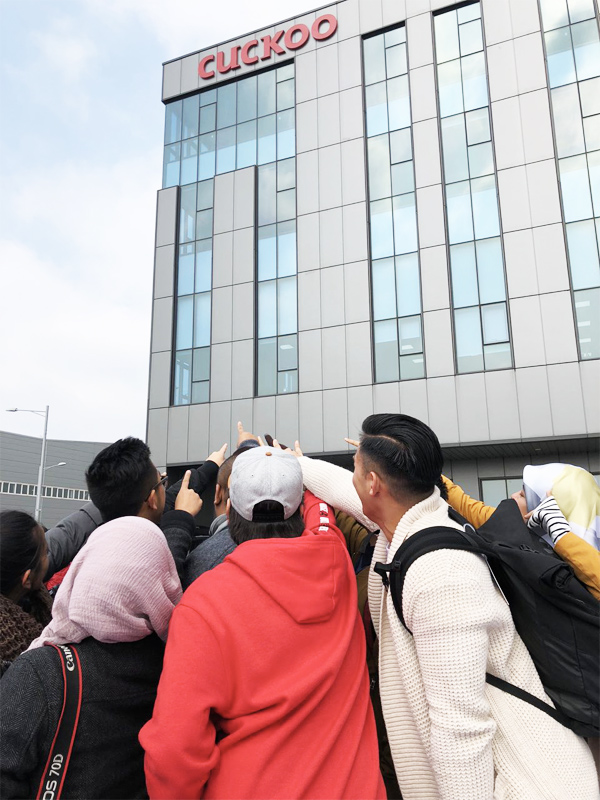
The media from Brunei outside one of CUCKOO factory in Seoul
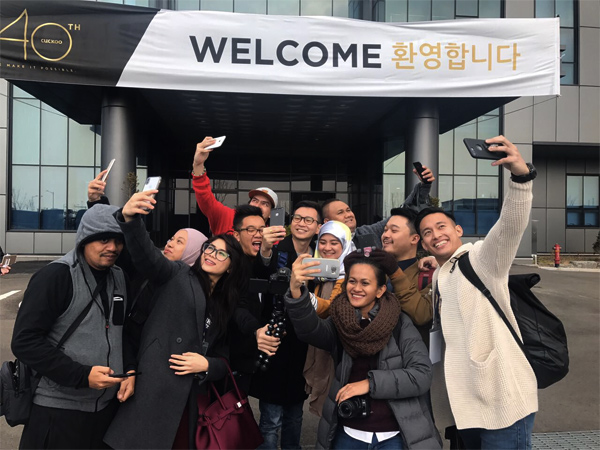
Posing with Mr. Hoe, CEO of CUCKOO Malaysia for one of the photo contest
What a fortunate treat for the local media from Brunei who had the privilege to visit the factories of CUCKOO (multi-cooker and water purifier). The first visit was at Yangsan factory located in Busan, South Korea.
I would have thought it would be stricter for companies as big asCUCKOO to allow visitors to see the production line of CUCKOO. So it was such a fitting trip that we as the media were given the opportunity to see how a strong brand likeCUCKOO made it so popular in the Asia Pacific.
The Yangsan factory we visited mainly focused on multi-cookers and kitchen appliances. We were brought to the conference room where delegates from Brunei, Malaysia, Indonesia and Singapore were introduced to the management team of Yangsan Factory.
We learnt that CUCKOO’s multi-cookers are known for four things: Smart Algorithm, Pressure Cooking, Heating Technology and Coating Technology. These advanced technologies helped one to prepare food or meal at a touch of button. At the factory itself, we had a sneak peak on how the functions were created.
For a person who rarely cooks and maybe most of the readers here, how does pressure cooking really helps or an advantage? Imagine you don’t have enough time to cook. By using CUCKOO’s multi-cooker, you can save 70% of your cooking time and that’s with the help of the pressure cooking technology inside CUCKOO multi-cooker. This is very ideal for the working class who has limited time when it comes to cooking.
It’s really hard to explain to those who aren’t familiar with cooking. But I can guarantee you that once a CUCKOO multi-cooker in in your hands, you won’t regret the purchase. It’s no surprise why 70% household in Korea uses CUCKOO brand for their cooking and that shows the Korean really trust their products.
For the record, CUCKOO multi-cooker is sold every 10 seconds in South Korea. How I wish I had the same business model like CUCKOO.
Now saying all that, all these technologies infused in CUCKOO’s appliances are manufactured at Yangsan factory. We saw some of the production lines within the premise and I was impressed with the dedication and precision by the CUCKOO factory workers. You will be surprised the average age of the workers which is around 24-25 years old.
We also had the privilege to visit the Siheung Factory which focuses more on water purifier. It has a similar production line concept like Yangsan and it’s located closer to Seoul. With the two plants in South Korea, they are able to produce more than 4.5 million set annually.
They have around a few hundred workers working behind the scene. All they focus is just their tasks given and I hardly see them having a conversation among themselves. It’s as if they are like human robots in the production line. That’s how discipline the workers are in the factory.
Interestingly enough, Brian Koo Bon Hak, the CEO of CUCKOO Electronics Co. Ltd, mentioned of a plan to build a RM 100 million factory in Malaysia to produce water purifier products. This will help to bridge the demand gap due to the rapid growth in Southeast Asia and Brunei is one of the emerging markets in the water purifier category.
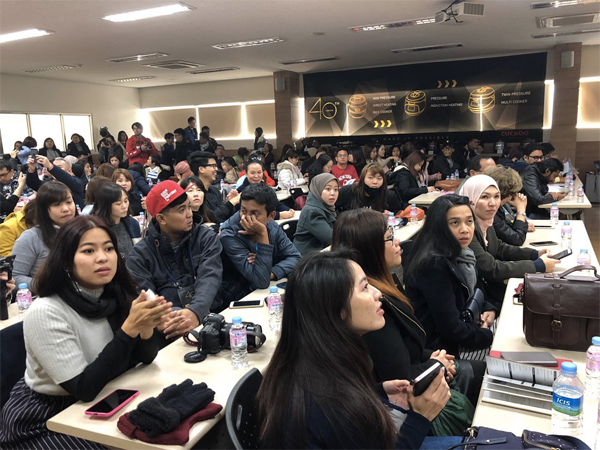
With the presence of media from Malaysia, Indonesia and Singapore during the media conference at CUCKOO factory in Seoul

One of the production lines for the CUCKOO multi-cooker

The workers are very focused and dedicate when handling the components

One of the semi-conductors used for the multi-cooker
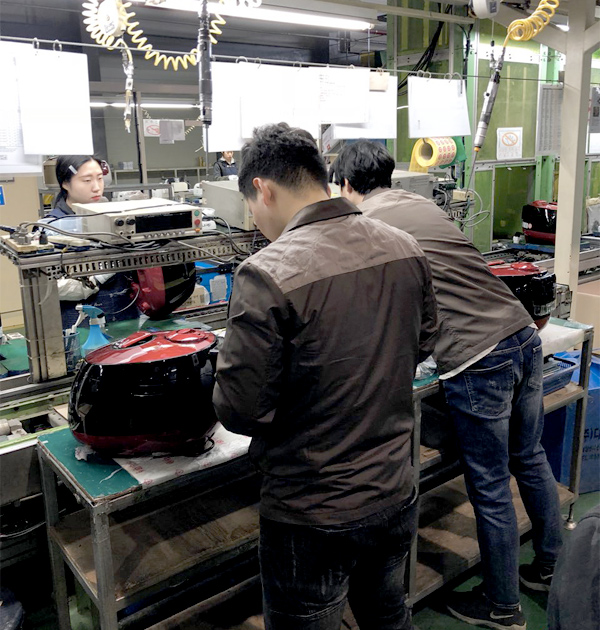
The faulty section where one will commission to see what went wrong with the unit

The upcoming multi-cooker model that is able to make Gaba rice
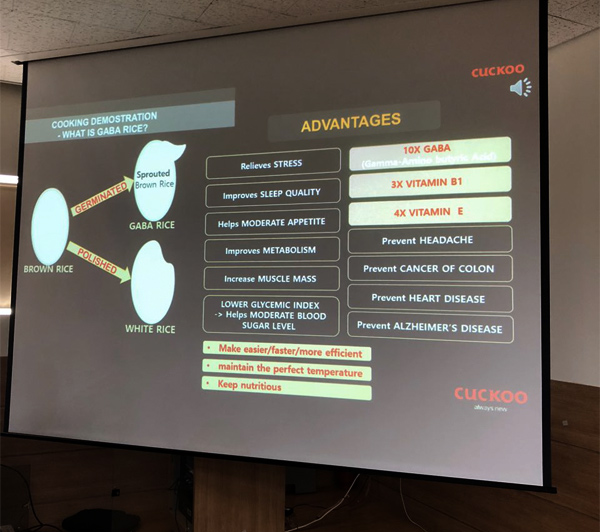
Gaba rice is better than brown rice and healthier
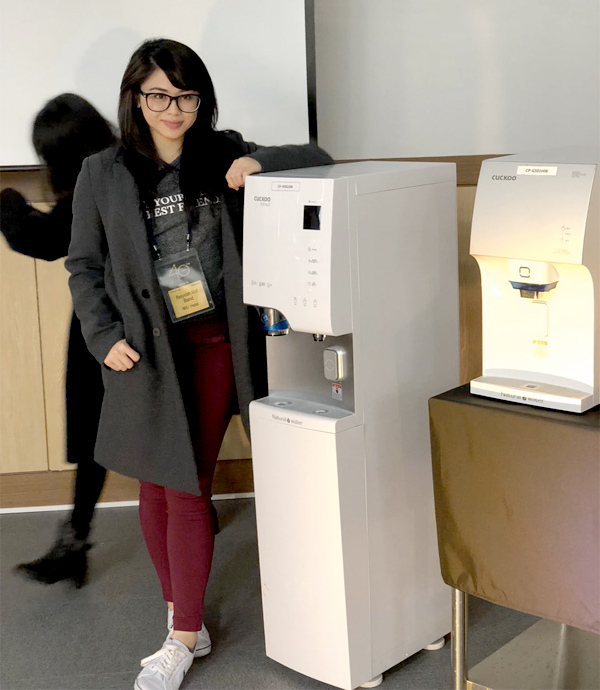
Our local model from Brunei posing with CUCKOO water purifier

Behind the scenes on how the water purifier are being produced


I was pretending to spy inside the production line :p
CIBFM Stakeholders Annual Retreat 2018
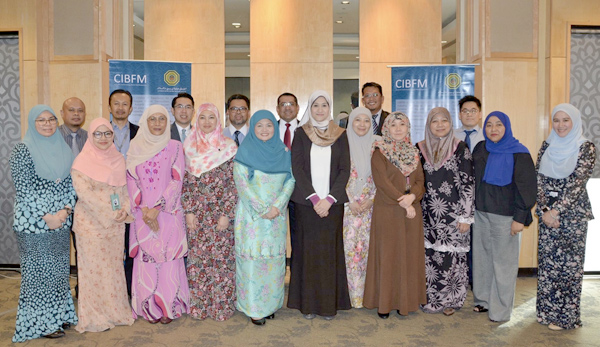
Centre For Islamic Banking, Finance And Management (CIBFM) hosted its Annual Stakeholders Retreat at The Radisson Hotel, Brunei Darussalam last week
Centre For Islamic Banking, Finance And Management (CIBFM) hosted its Annual Stakeholders Retreat at The Radisson Hotel, Brunei Darussalam. The event began with a recitation of Surah Al-Fatihah, followed by a welcoming remark delivered by Yang Mulia Dayang Hajah Sufinah binti Haji Sahat, Acting Deputy Chief Executive Officer of CIBFM.
The event then continued with a presentation by Mr. Prashant Chadha, Managing Director, Aon Hewitt Malaysia and Philippines on the topic ‘Redefining Workspaces of the Future – Employees’ View’. Aon Hewitt was specially invited by CIBFM for their insights on career development and effectiveness of human resource development and management.
This presentation was then followed by an open discussion amongst participants regarding challenges in the workspace and working environment. Amongst the challenges brought up were the constantly evolving work environment and the organisations’ roles in facilitating their workers in adapting to these changes.
The objectives of the event were to foster better relationships between CIBFM and its stakeholders, as well as to share the latest developments in human resource performance and management.
For your info, CIBFM is a training institution under the purview of Autoriti Monetari Brunei. CIBFM offers a variety of learning and development programmes ranging from financial literacy to leadership and management. For more information on CIBFM’s development programmes, members of the public may visit our social media accounts, @cibfm.brunei on Instagram and CIBFM Brunei page on Facebook, visit their website at www.cibfmbrunei.com, or call CIBFM’s hotline at +673 8271140.
Ramesh, Hamid win almost 1 million in damages
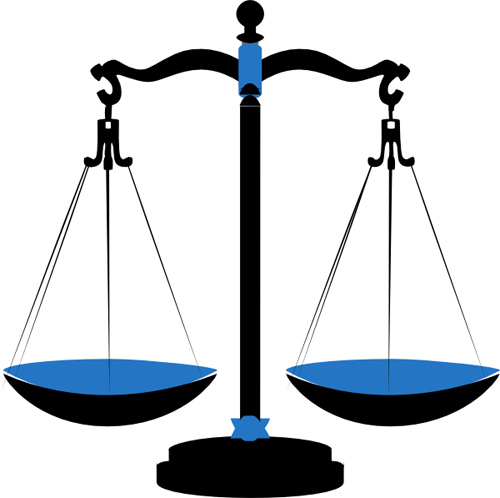
Finally justice has been served. A civil court case that lasted for almost 6 years and now the verdict/judgment has been handed down. Co-plaintiffs Ramesh Jiwatram Bhawnani and Abdul Hamid bin Abas won the biggest libel suit in Brunei Darussalam against the Indian Chamber of Commerce as the 1st defendant and Mohamed Zackiriah Nazeer Ahmad & 23 others as the 2nd defendant. They are: Mohamed Zackiriah Nazeer Ahmad, Jamnu Punjabi, Abdul Malick Mohamed Batcha, Abdul Rahim Kamaldeen, Mohamed Zubair Hamim Basheer, Mohamed Abdulla Inamulla @ Yunus, Venugopal Jayakumar, Abdul Packir Maideen, Punjabi Vishnu Tarachand, Noorsa Ahmad Sultan Noor Mohamed, Dawoo Batcha Mohd Jafarullah, Shaikh Mohamed Saburdeen, Abdul Sheik Dawood Munaff, Muthiah Chettiarmani, Vadakoot Sankunni Azhutchan Ramesh Chandaran, Poondiyar Shaik Peer Mohamed Sheik Dawood, Asiqurahman bin Haji Abdul Haleem, Haji Badurudeen S/O Tn Mohamed Ismail, Ubayathullah Hamim Basheer, Hidhayatulla bin Tajudden, Mohamed Hussain Mohamed Ali, Sulaimanayub Khan, Haji Mohamed Ali and Haji Mohamed Asraf @ Abdul Kader Asraf Ali.
The defendants are to pay BND 650,000 and BND 300,000 in damages to Ramesh Jiwatram Bhawnani and Abdul Hamid bin Abas respectively. This was announced in the written judgment prepared by Judge James Kerr Findlay, Judicial Commissioner.
How it all happened?
5th April 2010 – Indian Chamber of Commerce sent a letter addressed to the Indian High Commissioner to Brunei Darussalam, publishing defamatory matters on Ramesh Jiwatram Bhawnani and Abdul Hamid bin Abas.
29th November 2010 – Indian Chamber of Commerce sent a letter addressed to the Indian High Commissioner to Brunei Darussalam and Ramesh alleged he was libelled in that letter.
2012 – The case was brought to the court by Ramesh Jiwatram Bhawnani and Abdul Hamid bin Abas and were represented by Pg Izad and Too Shu Vun of Messrs Pengiran Izad and Lee.
2018 – During the 6 years, the case went back and forth until it reached the High Court. The defendants lost the case and the written judgment was handed by 24th March 2018.
What was the content in the letters?
It mentioned that Ramesh Jiwatram Bhawnani “has recently been increasingly involved in various malicious activities which in our opinion warrants investigation by the appropriate body in India”. It was also mentioned that Ramesh was engaged in money laundering and was a “Mafia style gangster”.
The other letter dated 29th November 2010 urged “stern action” against Ramesh as the defendants were “pretty sure that something worthwhile will be unearthed”. This letter repeated the serious allegation that Ramesh’s “business activities are in actual fact a sham to cover his illegal money-laundering operations”.
The second plaintiff Abdul Hamid bin Abas was alleged in the first letter where he had abused his position as an officer with the Ministry of Foreign Affairs and Trade.
In their defence
Back in 2014, at the Court of Appeals, the defendants claimed that the civil suit libel action “could not be maintained as the court was not competent to entertain a suit relating to communications relating to matters of State”. This was based on the provision of the Vienna Convention on Diplomatic Relations (the Convention).
The Court of Appeals discussed the question of “whether a letter written by a private person to a diplomatic mission may be adduced in evidence” and considered the Vienna Convention on Diplomatic Relations 1961.
In the decision, the court said the letters referred to in the libel suit are admissible.
“The Convention does not assist the appellants who have failed at this stage to show that either copy delivered anonymously to the respondents was taken from the original in the archive,” the Court of Appeals said.
“They have also failed to show that the respondents were complicit in the act of making either copy. On the evidence as it stands at present we find that the letters are admissible.”
The Indian Chamber of Commerce’s motion to strike out the civil suit libel action was earlier dismissed by the registrar and then by the Chief Justice before the matter was brought up to the three-panel judges at the Court of Appeal and then recently to the High Court.
From this case, it seemed that the defendants ) 1st defendant and Mohamed Zackiriah Nazeer Ahmad & 23 others as the 2nd defendant) were seeking for immunity.
Fast forward to the present moment
In the high court, the defendants wanted the judge to believe that the defamatory statements were published only to the Indian High Commissioner himself then. The second defendant told the judge the the letters were hand delivered and no copies were kept by the first defendant. Later in his evidence, he retracted this and said the first defendant had kept copies but he could not remember where they were. It is not possible to believe that the High Commission (then) on receiving these letters and even assuming he opens official letters personally, kept them to himself. The letters by the defendants are not marked as personal, confidential or otherwise to restrict their circulation.
In his judgement, Justice Findlay said “Benjamin Franklin said that three can keep a secret, if two of them are dead,” adding that human nature is such that statements like those made by the defendants, especially when they contain juicy gossip are bound to be spread. He also said that they were spread because the second plaintiff, who was a credible witness, told him of people speaking to him of the statements in the letters, where one of them asked him why he was working for a money-launderer and a gangster.
The defendants wanted the judge to find that there was no malice involved in making the defamatory statements. Judge replied by saying, “Frankly, it is difficult to think of a case in which malice is more obvious than this tone. The defendants admit that they had no basis at all for making defamatory statements. The second defendant was totally unable to give any explanation for this vicious attack on the characters of the plaintiffs. Malice must be found where defendants make defamatory statements knowing full well that there is no justification for making them.”
“I find as a fact that he was motivated by spite and malice and seeking to harm the plaintiffs. Apart from anything else, one only has to read the defamatory letters to detect that they reek of malice. My conclusion is that the defendants are liable to the first plaintiff for the publication of the defamatory matter contained in the 5 April 2010 and the first defendant and the fourth defendant are liable to him for the publication of the defamatory matter contained in the letter of 29 November 2010. I also conclude that the defendants are liable to the second plaintiff for the defamatory matter contained in the letter of 5 April 2010.
The judge concluded, “There remains the matter of the quantum of damages. I regard this as a serious case of defamation. The baseless allegations by the defendants were of the upmost gravity. It is difficult to think of a case more serious than the statement that the first plaintiff, a prominent businessman in Brunei, was a professional criminal or that the second plaintiff, as a senior government official, was corrupt and prepared to abuse his powers. It cannot be otherwise than that the plaintiffs suffered a loss of reputation, anxiety and stress. An aggravating factor is that the defendants sought to present a case that the defamatory statements were true until the case was on trial and continued to argue that there was no malice.
The judge also made the following awards of damages in favour of the plaintiffs. Justice Findlay also granted judgement in favour of the plaintiffs in these terms against all the defendants, jointly and severally, the one paying, the others to be absolved. The plaintiffs are entitled to their costs, to be taxed if not agreed. Furthermore, the judge will also consider interest if he receives a written submission on this issue.


Amount payable to Abdul Hamid bin Abas
Rano’s thoughts: This is the biggest defamation (libel) case in Brunei Darussalam with a total of BND 950,000. Previously it was a case for defamation where Abrahams, Davidson and Co. won a case against the defunct News Express back in 2002. The plaintiff was also represented by Pg. Izad and & Lee and the total award was BND 550,000. Finally after six years, the case can put to rest after a series of hearings in the court and even through the court of appeal. It’s the final straw but the defendants still have one card to play – appeal to the High Court.
It is important for all of us to know that defamation – libel and slander – can be damaging to one’s reputation. When you defame someone, it means you claim something that is false and untrue as they are no evidence to support that claim. In this case, the Indian Chamber of Commerce claimed that Ramesh Jiwatram Bhawnani is a “Mafia style gangster” in a written document and this will fall under libel category.
So ladies and gentlemen, be careful what you write online. All assumptions and accusations can be brought to justice. I know they are many keyboard warriors out there especially on reddit. So think twice before you post or simply don’t post at all.
Loving the Mercedes-Benz GLC 200

Click image to see more of the specs for the GLC 200
Mercedes-Benz proudly presents a further variant in the premium SUV segment in Brunei and provide a wider variety for its customers to choose from. This was launched late last year and it has been a popular choice for Bruneians and I shall reveal to you why.
The new Mercedes-Benz GLC 200 comes generously equipped with numerous high-end features including the 9G-TRONIC automatic transmission, an Off-road exterior package, 18-inch 5-spoke alloy wheels and LED High Performance headlamps.
The GLC 200 is equipped with the OFF-ROAD Exterior design which underscores the vehicle’s SUV characteristics with rugged design features in chrome. The radiator trim boasts an integral Mercedes star and two louvres in matt iridium silver with chrome inserts. Other select highlights include the 18-inch 5-spoke light-alloy wheels, the chrome-plated simulated underguard and the exhaust system with two visible, chrome-plated tailpipe trims and the anodized roof rails.
In addition to the striking look, the LED High Performance headlamps provide more safety at night thanks to a broad light distribution, a light colour similar to daylight and low energy consumption. The tail lights feature LED technology and create a visual highlight while improving visibility.
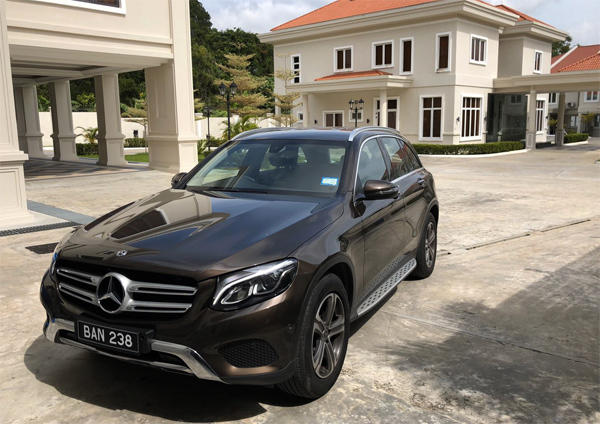
I had the privilege to test drive the GLC 200 for a couple of days. Addicted? Yes….
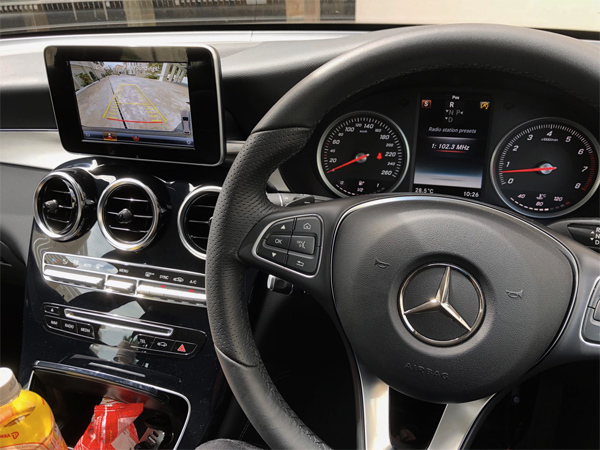
Turning the GLC 200 like my second home
Other innovative features such as the Parking Pilot, KEYLESS-GO with HANDS-FREE ACCESS, Central colour multifunction display, etc were also available in the GLC 200. Parking Pilot with PARKTRONIC and reversing camera makes it easier to both find a parking space and to enter and leave parallel or end-on parking spaces. The system automatically steers the vehicle into parking spaces, relieving the driver of the work of steering and braking.
The HANDS-FREE ACCESS function allows contactless, fully automatic opening and closing of the luggage compartment door – simply by performing a kicking movement under the rear bumper.
For customer who still prefer the 4 wheel drive feature, the GLC also offer the GLC 250 4MATIC permanent all-wheel drive. The GLC 250 4MATIC has a power output of 211 hp and 300 Nm of torque.
Other additional features in the GLC 250 4MATIC are AMG Line, 360 degree camera and 19-inch wheels.

Yes, the previous shipment of the GLC 200 didn’t come with Apple CarPlay. Fret not as the incoming batch will have this feature 🙂
The new shipment of the GLC 200 also comes with Apple CarPlay as the Smartphone Integration describe below.
Smartphone Integration allows integrating iPhones® via Apple CarPlay™ as well as Android smartphones with Android Auto into the vehicle, and operating them by voice control – certain functions can also be used via the vehicle controls. This makes safe use possible while on the move. The connection to the smartphone provides access to the latest software and data such as, e.g. navigation and traffic information, media (streaming media and IP radio), as well contact information, telephony/FaceTime and messaging. To prevent driver distraction while at the wheel, not all smartphone contents are duplicated.

Last November 2017, I had a first taste of the GLC 200 in Kota Kinabalu. I also test drove the GLC 250. Guess which was my preference of the two?

Mark Raine, Mercedes-Benz Cars vice-president of sales and marketing (Malaysia), posing with the Mercedes-Benz GLC 200 at Hap Seng Star showroom at Kota Kinabalu last November
Last year, I had a short interview with Mark Raine, Mercedes-Benz Cars vice-president of sales and marketing (Malaysia) and asked him why introduce the GLC 200 if the GLC 250 is already available in the market.
He responded by saying the GLC 250 which is a brilliant product where it’s an SUV 4WD and offers great speed and comfort, positioning it as a very sporty, luxury model.
However to a certain extent, Mercedes-Benz will be only capturing that lot of market but there are customers who want different qualities and traits and their mindsets are different from other customers. Hence the GLC 200 repositions itself in more exclusive luxury segment. It comes standard in on-road package or off-road package. The interior package also makes the value perception of this vehicle very, very high.
The GLC 200 is just a notch below the GLC 250, hence makes it more affordable for most customers in the market. The unique selling point of the GLC 200 will be the exclusive luxurious appeal with high value perception and many features at a very competitive price.

I’m in love with the Mercedes-Benz GLC 200 and it really suits my persona

Hands free assist parking and it also does reverse parking aside from parallel parking
Rano’s thoughts: As I’ve mentioned before, I am in love with the GLC 200. Mercedes has always been my preferred brand because of its status and quality. Driving the GLC 200 reassured my confidence in what the GLC 200 can offer.
The handling is pretty good and I had a good drive from bandar to KB and the most important thing is comfort and safety. The handling is superb especially for an SUV.
Of course, the GLC 250 has much power because of its 4WD option. For me, the GLC 200 is still good enough for me and it still packs some power when I drove up the hilly roads at Kota Batu.
You will be surprised how much the GLC 200 costs on the road. With all the features and the specs plus the brand of Mercedes, it’s priced around BND 76,000ish on the road. When I posted the price on my social media platform, many werent’ aware how competitive the price is for the GLC 200. For an extra BND 6,000ish, you can also enjoy the GLC 250 model.
Hence, this particular model is selling like hot cakes. So visit Jati Transport if you are keen on the Mercedes-Benz GLC 200. Who knows if I have enough “rezeki”, this will be my first choice.
Verdict: Attractively priced and packed with great features. Furthermore, I can be biased because it’s a Mercedes-Benz. You can deny it how much of a steal this is for BND 76k. I shall give this a 9/10.
Plus-EXP launched

Click image to enter website

Aiman Minorhadi, Co-Founder of Grominda Group
Recently Grominda Group launched a new platform called Plus-EXP at the Design & Technology building.
Plus-EXP is an online platform that provides work experience opportunities powered by Grominda Group. Grominda Group is a research company that focuses on fostering the development of human capital through the early stage of career development. Grominda Group’s vision is to be the leading centre for youths’ development in the region. They pledged to develop leaders of the future by believing in their core values, to instill youths with integrity and be competitive in any market conditions by empowering them with innovation thus inspiring them to be ambitious.
Hence, Plus-EXP is created to enable talents (youths) to apply for internships directly from work experiences offered by companies. This platform is intended to make it easier for talents to connect with companies to gain working experiences thus tackling the issue of lack of working experiences. They are also working with both institutions and companies to align university courses in Brunei Darussalam with job market demands.
Another feature included in the website is trainings and workshops. For instance, their own Recruitment Consultant provides CV Clinics and Interview Techniques workshop and talents can apply for this workshop by signing up on Plus-EXP. They will also be looking to cooperate with other companies to provide trainings that will improve work experiences.
For now, registration for both companies and talents are already available. However, they are still consolidating the data for the website thus the full features of the platform will only be available at the end of April.
For more information or any further inquiries, call +6738297027 or e-mail grominda@gmail.com.
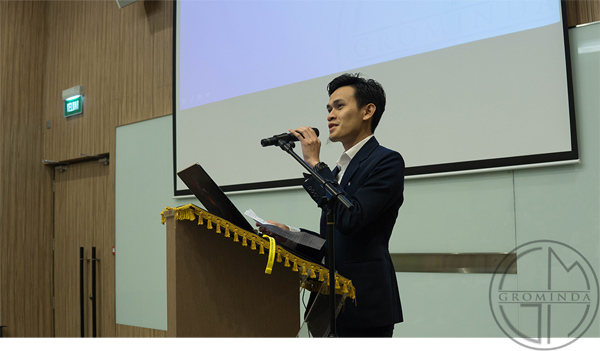
Firdaus Bohari, Co-founder of Grominda Group
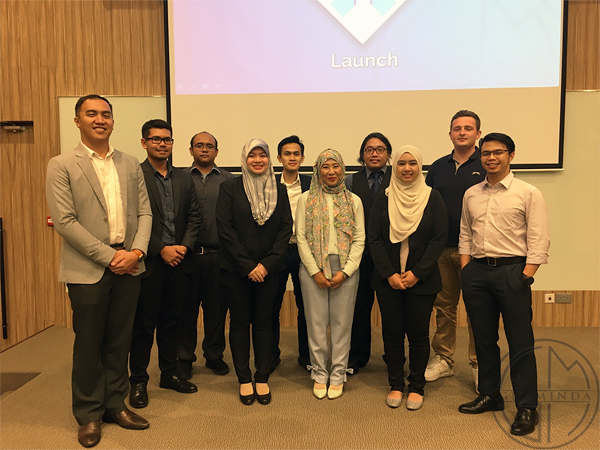
Plus-EXP team
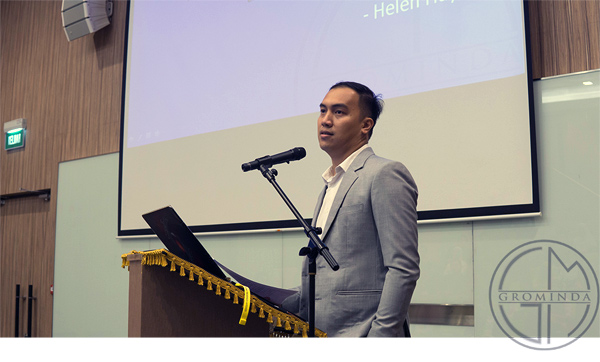
Anthony Sigar, CEO of Grominda Group



BeliHelix II first monthly draw

The winners for the month of February 2018. There were more than 4,000 entries.

Noraziah binti Kunchil bagged herself the grand monthly prize with a flight to Ho Chi Minh City, presented by Mr. Hong Chian Kai, General Manager of Kien Sing (Tan). Apparently, Noraziah has never been to HCM City and only Hong Kong. So, it’s such a fitting prize for her to fly to HCM.
Brunei Shell Marketing Co. Sdn. Bhd. (BSM) launches another round of #BeliHelix promotion after the great response from the last promotion which commenced from 1st November 2017 until 31st January 2018.
This second promotion is to give our customers another chance to win more exciting prizes. It will be held for a period of three months starting from 8th February 2018 until 30 April 2018. Similar to the first promotion, there will be five (5) monthly draw prizes to be won for the months of March and April. The Grand Draw of the #BeliHelix Promotion II is set to be held in May 2018. The date and venue for the grand draw shall be announced by BSM in due course.
Earlier today, BSM feted the top 5 monthly winners for the #BeliHelix II edition which was held at a Shell Helix Branded Workshop, Kien Sing (Tan) in Kg. Medawa (Spg 618).
Present during the draw were Hjh Siti Kurshiah Hj Anuar, BSM Head of Commercial, Mr. Hong Chian Kai, General Manager of Kien Sing (Tan) and Wacharit Engpanyalert, Shell Country Sales Manager.
Noraziah binti Kunchil bagged herself the grand monthly prize with a flight to Ho Chi Minh City, Vietnam while second place winner went to Othman Hj Abu Bakar, who won a Samsung Sound Bar. Third place winner was Mohd Shardy bin Narudin who now owns a Samsung J7 Pro. The other consolation prizes went to Abdul Ayyub Hj Yusub and Dayang Haziqah Hj Awang who won a Garmin Forerunner 30 and a Samsung Tab J respectively. Each of the winners also brought back a Shell Helix product.

Othman Hj Abu Bakar received a Samsung Sound Bar from Mr. Hong Chian Kai

Mohd Shardy bin Narudin received a Samsung J7 Pro from Mr. Hong Chian Kai

Abdul Ayyub Hj Yusub, who’s an avid runner, received a Garmin Forerunner 30, from Hjh Siti Kurshiah Hj Anuar, BSM Head of Commercial
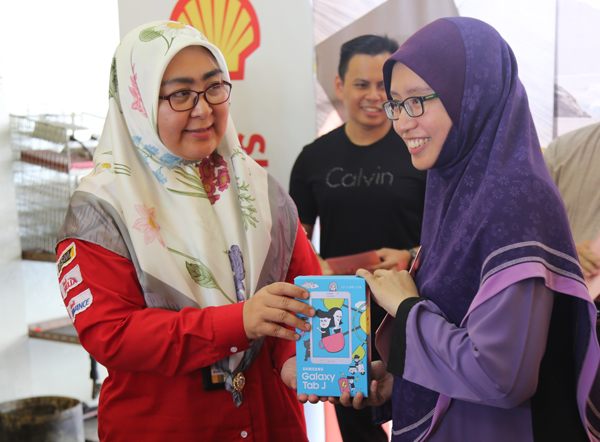
Dayang Haziqah Hj Awang received a Samsung Tab J from Hjh Siti Kurshiah Hj Anuar
The #BeliHelix promotion II comprises of monthly consolation prizes such as air tickets, latest gadgets, electrical appliances and more. For this round, the Grand Prize will be a unit of the latest Nissan X-Trail. First runner up will be a Hong Kong Travel Package for two persons and the second runner up will receive B$2,500 cash card. Other consolation prizes will also be available for the lucky customers.
According to Mr. Hong Chian Kai, General Manager of Kien Sing (Tan), he was quite delighted with the ongoing #BeliHelix promotion as it helps to stimulate the economic growth domestically and his business has seen an increase in sales, partly due to the #BeliHelix promotion. Most of the loyal customers would take the initiative to service their cars and trust the products of Shell apart from the advantage of being part of the promotional draw. He was very thankful to BSM for creating such campaign which was more successful in attracting customers. KST has been around for 40 years and with the Shell Helix Branded Workshop, it gives more trust to their customers in ensuring good quality repairs and services to their cars. If you plan to send your car for servicing, do give KST a shot and you’ll also be entitled for the lucky draw and stand a chance to win a brand new Nissan X-trail 😀
For those interested in the draw, Shell Helix customers will be entitled to one (1) entry form for each purchase of 4L of Shell Helix Motor Oil which comprises of Shell Helix Ultra, Shell Helix HX7 and Shell Helix HX5. Drop boxes for completed entry forms are available at participating BSM Authorised Distributors, Dealers and Retail Stations which can be located from www.bsm.com.bn.

The shortlisted winners choosing their draw

Mr. Hong Chian Kai, General Manager of Kien Sing (Tan) was truly appreciative of Brunei Shell Marketing for their initiative campaign #BeliHelix and also KST’s loyal customers. One of the winners was apparently from KST.
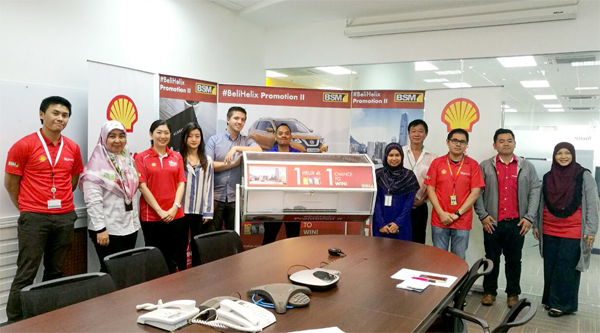
The media did a preliminary draw last week at Brunei Shell Marketing office

Raids: Talk of the town
It has been an interesting month (March) where many things have been unfolded. Cases of robbery has been on a high as of late. An unexpected corruption case has unofficially raised a many eyebrows, putting a shame on an important agency in Brunei Darussalam. A common trend of raids have been conducted in the capital where illegal substances such as drugs and alcohol consumption were the main highlights. As for the LegCo, it proceeded smoothly without much talking points and good job to The Scoop for such an interesting perspective on this year’s LegCo. Keep it up!!
Let’s talk about the robbery case for now. I can see how the Royal Brunei Police Force through the Public Relation Unit have been very active in conducting Neighborhood Watch among the RBPF and the community. This is a great initiative especially for the residents to be extra vigilant when it comes to their homes and possessions. There have been an increase amount of break-ins and car thefts. This month, I have already received three separate incidents of cars being stolen and one of them happened to be my friend. The worst thing was that his cars were stolen from his own home.
Another friend of mine had his car broken into at the vicinity of his own home. Though the thief didn’t manage to find anything in his car, my friend had to fork out a fortune to repair his window. Even his dog wasn’t able to deter the thief as he fed the dog with some bones. Even CCTVs these days won’t be much of use as most thefts have upped their game by wearing masks, making it harder to identify. The best the CCTV can do is to alert the home owners for them to make the conscious decision to either apprehend the thief or make an emergency call to the police.

Just in today’s article about a break-in. I’m pretty sure there are many cases that are not published in the papers and only being reported to the Royal Brunei Police Force.
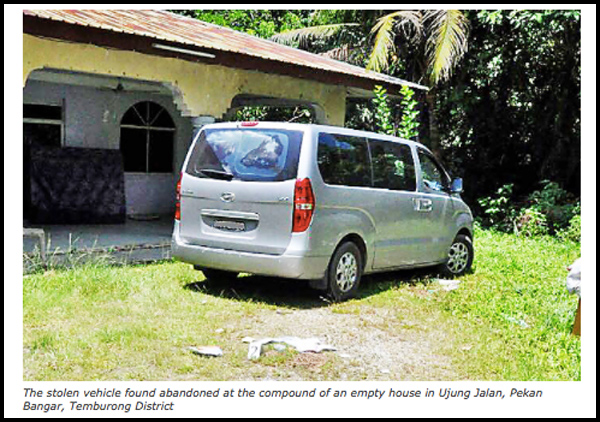
A successful arrest to the 3 suspects believed to have been involved in the recent car theft. Click image to read article from Borneo Bulletin.
Raids. Hmmm… Surprising these surprise raids have been frequent as of late. Illegal activities such as gambling, drinking and drugs consumption and organizing gatherings without permits. The “drinking” incident is a unique one. For many years, the drinking venues have been in operation and only recently, the raids took place concurrently at the two drinking joints. It was mentioned from an inside source that the attendees were questioned at the police station and released soon after. I remember these raids to be common back in the early 2000s where illegal gatherings or parties were a huge trend. Places such like AquaWave, Excite and RBRC were hotspots for night gatherings back then.
Though there are no such gatherings of that magnitude this time round, the recent gatherings are still considered illegal if there is no permit or approval from the relevant government agency. Last weekend, a music gig was being raided at Gadong and all those being present (176 of them) were escorted to the police station for statement. It seems that there was a tip off, concerning the possession of “plastic package containing dried leaves” and pills believed to be drug, according to the press release. Kudos to the RBPF, Royal Customs and Excise Department and Narcotics Control Bureau as I am strongly against the consumption of drugs. I do feel sorry for the innocent and harmless ones who were present, just to show support to the local music scene. But when drugs are involved, it’s a huge no-no for me. So ladies and gentlemen, SAY NO TO DRUGS.

The items being found during the raid last weekend. Image screenshot from RTB coverage.

Another illegal substance labelled as dried leaves were found as well during the recent raid last weekend. Image screenshot from RTB coverage.

The raid on one of the drinking joints in the capital recently. Image from @upa.ppdb
Tip for organizers: It’s important for you to apply for permit or approval for any such gathering especially involving music or a gathering. I believe the latest music gig didn’t have a proper permit and of course, the attendees do trust the organizers that the event was a safe environment then. It’s important for all of us to be aware of the rules and regulations when it comes to events of this nature. The Big Jam at the end of last year was a success because they had proper approvals and permits and I felt safe attending these events.
Last year, I was offered to be a social media partner for a music gig event. The first thing I asked if he has the approval from MOHA. Otherwise I would not agree to be a partner or such. Let this a learning lesson for all that we cannot take such events very lightly. Apply to the relevant authorities and you can avoid such embarrassment and don’t put others in unnecessary danger and shame.

